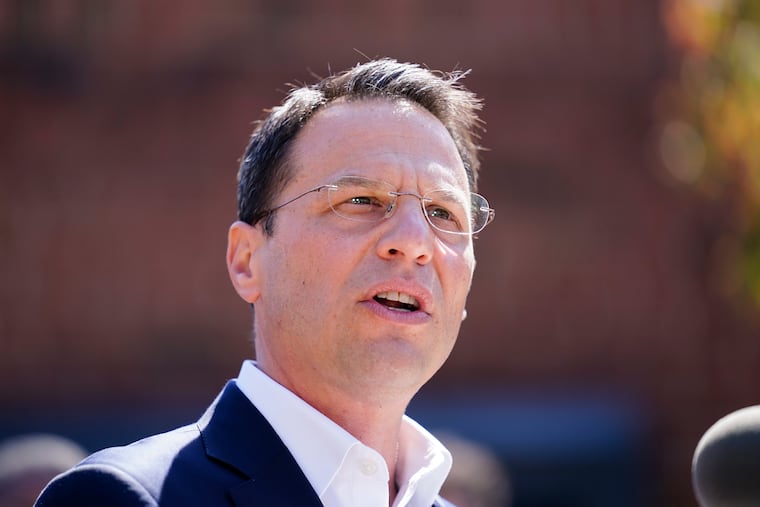AG Shapiro argues DA Krasner can’t sue his office over opioid settlement
DA Larry Krasner says the national settlement that Shapiro helped broker is a “sellout” that won’t deliver enough money to Philadelphia. Shapiro said Krasner lacks standing to bring his suit.

Pennsylvania’s attorney general argued in court papers Wednesday that Philadelphia’s district attorney doesn’t have the right to sue his office over a national opioid settlement that could bring up to $1 billion to the state — but that elected officials in Philly have criticized as too low.
DA Larry Krasner has an ongoing case against drugmakers and distributors, and says the national settlement — that the attorney general helped broker with four of those companies — is a “sellout” that won’t deliver enough money to Philadelphia. He filed suit against Attorney General Josh Shapiro in July, asking the state’s Commonwealth Court to rule that Shapiro can’t sign away the district attorney’s opioid suit under the settlement. Allegheny County’s district attorney, whose office covers Pittsburgh, also sued Shapiro over the matter.
In new legal filings, Shapiro’s office says the DA “lacks the power” to request such a judgment, and the suit should be dismissed. There is no statutory authority, the AG argues, giving a district attorney “the ability to file suit on behalf of the Commonwealth against the Attorney General, seeking to stop him from exercising his power to act.”
The City of Philadelphia “has the right to decline to participate” in the settlement, the filing argues, but Krasner “does not represent” the city in his opioid suit.
If one of the companies tries to use the settlement terms as a defense against Krasner’s suit later, the AG also argues, it will be up to another court “to decide the effect” on Krasner’s case.
“As our objections make clear, these lawsuits are nothing more than a stunt to mislead residents of Philadelphia and Pittsburgh,” said James Donahue, executive deputy attorney general in charge of the Public Protection Division.
Local governments that join the settlement “will see an immediate infusion of funding” to combat the deadly epidemic, Donahue said. Otherwise, he said, “they face high-risk litigation ... and many years of waiting for money to reach neighborhoods even if they are successful.”
Krasner said the response from the AG’s office amounted to “coercion” against those who oppose joining the settlement. “What this filing stands for is that Big Pharma and the AG’s office have linked arms to strip Pittsburgh and to strip Philadelphia of their absolute right to pursue litigation against Big Pharma,” Krasner said.
“They don’t even want a higher judge to confirm that we have an absolute right to pursue these claims to their conclusion,” Krasner said.
Philadelphia has its own opioid suit against drug companies, and in July Mayor Jim Kenney voiced skepticism about the national settlement’s terms and how much the city would receive.
“We’re continuing to review the settlement and our previous statement of concerns still stands,” spokesperson Kevin Lessard said Thursday.
Shapiro is part of a small group of state attorneys general that negotiated a $26 billion deal with some of the companies accused of fueling the drug epidemic, in an effort to resolve thousands of suits by municipalities and other groups that have shouldered high costs from the crisis. The companies have denied wrongdoing.
After the deal was announced, individual states had a month to join. In those states that said yes, local governments now have until early January to make their own choice.
There’s an element of group pressure to the decision. Collecting Pennsylvania’s maximum settlement share of $1 billion depends, in part, on how many cities, counties, and other “political subdivisions” agree to give up their claims against the companies. Every Pennsylvania community with more than 10,000 people needs to participate for the state to get its full share, according to the AG’s office.
Philadelphia’s lawsuit and Krasner’s suit, along with dozens more Pennsylvania cases, have been coordinated through the Delaware County Court of Common Pleas. Four of those cases — including Krasner’s — were selected to go to trial first in their home jurisdictions. No trial date has been set yet, though Krasner said Thursday he expects to go to trial in early 2023.
“Big Pharma doesn’t want to see verdicts,” Krasner said. “They’re afraid of big, fat verdicts against them.”